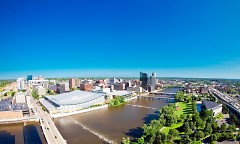The Grand Rapids City Commission voted unanimously this evening to pass two ordinances pertaining to caregivers who grow and distribute medical marijuana in their homes. According to an official memorandum authored by Planning Director Suzanne Schulz, current regulation divides caregivers into two categories, Class A and Class B, based on the level of “neighborhood impact” resulting from marijuana related activities in residential homes (this situation is referred to in official documents as “home occupation”). The new ordinances are meant to further define this distinction.
Medical marijuana caregivers are allowed to service up to five patients and grow up to 12 plants per patient. Class A caregivers may not receive client visits in the home at all. Class B caregivers may receive up to two clients at a time, and are allowed to use grow lights and hydroponic systems in their homes. To obtain a Class B permit, caregivers must submit floor plans, allow for special inspections, and provide parking for their visiting clients. Currently all production and distribution of medical marijuana takes place in private residential homes. Commercial dispensaries were officialy defined by the legislation passed tonight and are prohibited in Grand Rapids at this time.
Commissioner Ruth Kelly, who presented the two ordinances at the meeting, pointed out that Grand Rapids is a leader in the state when it comes to the implementation of the medical marijuana law.
“We had to come up with some way to allow people to have access to medical marijuana and at the same time keep residents safe...” Kelly said. “So the city had to come up with both the zoning and licensing language, and that is what other cities, who are going to have to eventually do this too, want to copy.”
Kelly listed Detroit, Ada and Royal Oak as cities who have looked to Grand Rapids for help in this area. Both Kelly and Schulz expressed concern that there are many gray areas that make the the medical marijuana law difficult to implement, but that the goal in Grand Rapids is to keep medical marijuana legal.
The memorandum in question can be viewed here. (Search for ordinances 2 and 3)
The Rapidian, a program of the 501(c)3 nonprofit Community Media Center, relies on the community’s support to help cover the cost of training reporters and publishing content.
We need your help.
If each of our readers and content creators who values this community platform help support its creation and maintenance, The Rapidian can continue to educate and facilitate a conversation around issues for years to come.
Please support The Rapidian and make a contribution today.


Comments
We saw a group of ACLU attorneys in the Meanwhile Wednesday night who were in town to "sue the city." Might be interesting...
I don't know everything about the law, but it seems as if municipalities (GR included) are not listening to the citizens who voted to legalize marijuana for medical purposes. In other cities, they have tabled the issue. In GR, they seem to be over-zoning. A friend told me that you have to be 1000 feet from a school/daycare to be a care provider. Bars only have to be 500 feet.
Just seems as if the law is not being applied as many voters would have hoped...